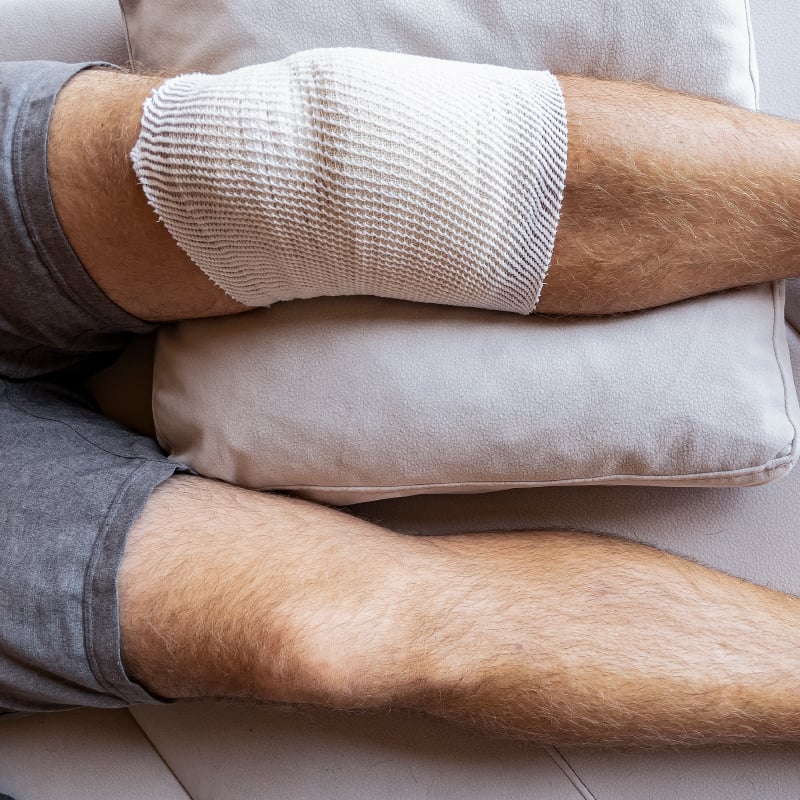Key Takeaways
- Arthritis, bursitis, tendonitis, and rotator cuff tears or injuries are some of the common reasons why people have shoulder pain at night.
- Anti-inflammatory medications, using ice, sleeping in a recliner, and avoiding activities that cause shoulder pain can help.
- If the pain or loss of motion worsens, or swelling, bruising, weakness increase, schedule a visit with an orthopedic specialist.
Every year, over four million people experience shoulder problems in the United States. Shoulder conditions and injuries can cause significant discomfort and pain. For many people, that pain gets worse at night. No matter what you try, you may be struggling to get rid of your discomfort—whether it is sharp pain, stiffness, achiness, or dull pain—many find themselves struggling to relax or even sleep due to shoulder pain.
Dr. Rami Elshaar, Medical Director of Shoulder Surgery at Rochester General Hospital, specializes in the treatment of shoulder injuries and pain. He explains why shoulder pain often worsens at night and how you can help reduce it.
Why does my shoulder hurt more at night?
There are a variety of reasons why you might be experiencing shoulder pain and why that pain feels worse as you're heading to bed.
“While there is no precise reason why shoulder pain can be worse at night, some factors may include direct pressure on your shoulder when laying on your side, overuse during the day, and gravity pulling on your tendons or ligaments in your shoulder as you lay on your back,” said Dr. Elshaar.
Three conditions commonly lead to increased shoulder pain at night: bursitis, tendonitis, or rotator cuff tears/injury.
Bursitis
Subacromial bursitis is inflammation of the bursa in your shoulder. Bursa is a thin, sac-like structure that works as a cushion to reduce friction between tissues of the body. The condition is likely caused by overuse of your rotator cuff muscles following repetitive shoulder motion or overhead activities. Inflammation in the bursa can cause significant pain while lifting or performing a rotational motion with the shoulder.
When you lay on your side, the bursa in the shoulder can be compressed, leading to increased pain at night or when trying to sleep that may persist until proper treatment is provided.
What is the difference between bursitis and osteoarthritis?
The shoulder has cartilage and bursa—both components work to protect the tendons and bones in the joint. Osteoarthritis is a condition in which the cartilage in your joints begins to deteriorate, causing the bones to rub together. Bursitis occurs when the bursa is inflamed.
Tendonitis
Often a result of long-term overuse, tendonitis in the shoulder is when the rotator cuff tendons become inflamed and irritated. This condition becomes more common with older age as tendons become less flexible and more prone to injury.
For those with tendonitis, a variety of factors can cause more pain at night, including decreased blood flow to the area, effects of gravity, and overuse during the day.
Arthritis
When someone has arthritis, the gradual wear and tear of the cartilage inside the shoulder joint causes it to become inflamed. As the cartilage wears away, people often notice one or more of the following symptoms:
- Pain in the shoulder
- Stiffness in the shoulder joint
- Grinding, clicking, or cracking sounds or feelings in your shoulder
- Limited range of motion
As arthritis progresses, any movement of the shoulder can cause pain – especially at night. This can make sleeping challenging.
Rotator cuff injury or tear
The rotator cuff is the group of muscles and tendons that connect the upper arm to the shoulder blade. Its purpose is to stabilize the shoulder and allow for smooth movement of the joint. These muscles are needed to raise your arm overhead and rotate your arm in front and behind your back.
Damage or tear to any of the muscles in the rotator cuff can lead to significant pain, weakness, and loss of motion. Simple tasks like getting dressed, reaching behind your back, and reaching overhead can become very challenging. Tearing and injury to the rotator cuff become more likely as tendons in the shoulder naturally wear down over time.
Due to gravity, laying down can cause the rotator cuff to stretch and pull, leading to significantly worsened pain at night.
At-home remedies to relieve pain
If your shoulder pain is worse at night, it is likely due to inflammation or swelling. Dr. Elshaar recommends taking a few steps to reduce pain:
- Take anti-inflammatory medicine, such as ibuprofen or naproxen.
- Sleep in a recliner to avoid pressure on the shoulder and reduce the influence of gravity.
- Apply ice to the area to help decrease inflammation.
- Avoid activities that contribute to the overuse of the shoulder.
When to see a doctor
There are a variety of reasons why one might seek medical attention for shoulder pain. Sudden injury, persistent pain despite home remedies, loss of motion, weakness, swelling, severe pain, or bruising are all reasons to reach out to a physician.
“If your shoulder pain does not go away or continues to worsen, we recommend contacting an orthopedic specialist. They can work with you to examine, diagnose, and properly treat your condition in a timely manner in order to help reduce pain and discomfort,” said Dr. Elshaar.









